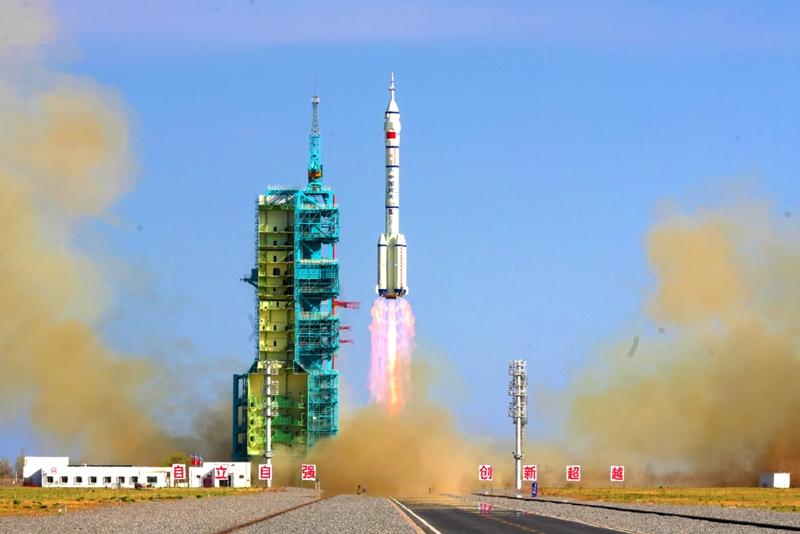China-Pakistan relationship tugs new string of space collaboration, friendship

The Shenzhou XX crewed spaceship, atop a Long March 2F rocket, blasts off from the Jiuquan Satellite Launch Center in northwest China's Gobi Desert, April 24, 2025. [Photo by Zhang Xiaoning/provided to chinadaily.com.cn]
On Friday, the three astronauts aboard China's Shenzhou-20 spaceship entered the country's Tiangong space station and started a new round of in-orbit crew handover. A day earlier, when the Shenzhou-20 crewed spaceflight mission left the Jiuquan Satellite Launch Center in Northwest China, it marked another milestone in China's space development and is leading to a high point for China-Pakistan friendship. In the backdrop of Shenzhou-20, the Tiangong space station and China's space program, the tenacious China-Pakistan relationship will tug the new string of space collaboration and friendliness.
On Wednesday, the China Manned Space Agency announced that China will select and train two Pakistani astronauts for space missions, with one slated to serve as a payload specialist on a future Chinese space station flight. In February, China and Pakistan signed an agreement to send a Pakistani astronaut to the Tiangong space station, marking the first time a foreign national will be aboard the facility.
This is an epic development in space exploration for both China and Pakistan. The inclusion of a Pakistani astronaut in an international mission unveils an awesome milestone for Pakistan's space ambitions, seeking to deepen its scientific and technological cooperation with China.
Pakistani Prime Minister Shahbaz Sharif instilled profound avidity in expanding Pakistan-China cooperation in space technology, satellite communications and internet services during a meeting with a delegation from a Chinese space technology company in Islamabad on Tuesday. As a "very trusted friend" and "strategic partner," Sharif has envisioned Beijing as the cornerstone for Pakistan's ambitious space technology sector.
While China's space cooperation with Pakistan has set an exemplary case for cooperation between countries, the Shenzhou-20 spaceflight mission means a lot for the international community, especially the Global South.
Guided by the concept of building a community with a shared future for mankind, China's space program, making a new stride through Shenzhou-20, is working with other countries to carry out international space exchanges and cooperation, safeguarding outer space security, and striving for long-term sustainability in activities related to outer space.
By doing so, China is contributing more and more to protecting the Earth, improving people's well-being and serving human progress. Peaceful high-tech exploration, technological development and utilization of outer space are rights equally enjoyed by all countries. China calls on all countries to work together to build a community with a shared future for mankind and carry out in-depth exchanges and cooperation in outer space on the basis of equality, mutual benefit, peaceful utilization and inclusive development.
China's space initiatives are not self-centered. Rather, they safeguard the central role of the United Nations in managing outer space affairs, abiding by the Outer Space Treaty, in the formulation of international rules regarding outer space and promoting greater sustainability of space activities.
According to a white paper titled "China's Space Program: A 2021 Perspective" released by China's State Council Information Office in 2022, since 2016, China has signed 46 space cooperation agreements or memoranda of understanding with 19 countries and regions and four international organizations. It has promoted global governance of outer space, and carried out international cooperation in space science, technology and application through bilateral and multilateral mechanisms.
China has helped Global South countries to boost their space science and research, and build satellite research and development infrastructure. For instance, in Africa, China has strengthened space partnerships through investing in satellites, ground stations, and research infrastructure. Moreover, it has also pressed ahead with the construction of the Belt and Road Initiative Space Information Corridor, and opened China's space facilities to developing countries. China is taking the lead in making human progress.
(The author Yasir Habib Khan is the founder and director of the Pakistan-based Institute of International Relations and Media Research.)